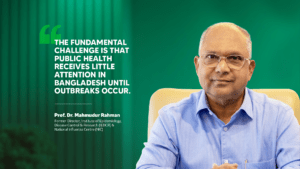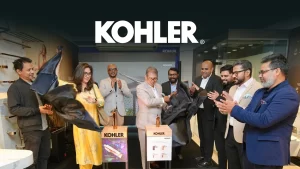1. Let’s start with your career journey, what initially inspired you to pursue a career in human resources, and how your passion for HR evolved over the years considering your career journey spanning over 26 years in the HR field.
My HR journey began with Nestle, where I joined a budding and dynamic HR team that was in its formative stages. Initially, I didn’t know much about HR, but my desire to work with people led the interviewer to guide me into this field. Being part of a newly formed team allowed me to explore various aspects of HR—from job evaluations to training and compensation. It was a hands-on learning experience that shaped my career.
I was also involved in significant transformation projects, which taught me how to view people as key assets. Despite an opportunity to switch to marketing, I realized HR was my true calling, driven by the thrill of transformation and learning.
Over my 26-year career, I’ve embraced diverse challenges across industries like FMCG, telecom, development, banking, and manufacturing. This variety has kept me engaged, constantly learning, and adapting to new environments. What continues to inspire me in HR is the chance to impact every division of an organization, understand the broader business, and drive meaningful change.



2. Looking back at your career, what would you say are some of the key highlights or achievements that have defined your professional journey? Are there any particular projects or initiatives that you are especially proud of?
One of the key highlights of my career was being part of Nestle’s transformation journey during its early HR formation. Another defining moment was my time at Lafarge, where I played a pivotal role in reopening a closed mine—a critical task since the mine’s shutdown directly impacted factory operations. We ran multiple projects aimed at enhancing efficiency and cost-effectiveness, which helped stabilize the business amidst mounting delays and costs.
At Perfetti, I tackled a major challenge involving concerns about child labor in Bangladesh. Despite no direct evidence, compliance issues with third-party vendors were identified from complaints of the Trade Union. Leading a year-long project, I implemented rigorous compliance measures and overhauled vendor processes. This experience was deeply rewarding and highlighted the importance of integrity and effective risk management in my role.

3. As the Chief Human Resource Officer at Grameenphone Ltd., what are your immediate priorities and goals? How do you plan to align the HR strategies with the company’s overall vision and objectives?
As the Chief Human Resource Officer at Grameenphone Ltd., my immediate priorities are centered on aligning our HR strategies with the company’s overarching vision of becoming future-ready. This involves a strategic focus on modernizing processes, enhancing our systems, and fostering a culture of diversity and empowerment across all levels of the organization. By investing in our people and leveraging innovative HR practices, we aim to build a dynamic and adaptable workforce that not only meets but anticipates the challenges of tomorrow, ensuring Grameenphone Ltd.’s continued success in a rapidly evolving market.



4. Grameenphone Ltd. is a leading telecommunications company in Bangladesh. How do you see your role evolving to meet the challenges of this dynamic industry, especially in the context of digital transformation and technological advancements?
In the ever-evolving telecommunications industry, my role is continuously adapting to embrace digital transformation and technological advancements. I pride myself on being resilient and open to learning, which has been crucial in navigating changes across diverse work environments with diverse workforces —from managing workers to collaborating with corporate professionals. Staying relevant means understanding new trends and technologies, even when they challenge my current knowledge. I frequently engage with younger colleagues to bridge knowledge gaps, such as those related to AI. I believe that effective leadership in this dynamic landscape comes from merging the insights of both seasoned and new-generation professionals. This collaborative approach allows us to leverage each other’s strengths, ensuring we stay ahead in a rapidly changing industry.

5. What strategies or initiatives do you plan to implement to ensure Grameenphone Ltd.’s attractive workplace for top talent considering the fact that employee engagement and retention are critical in today’s competitive market?
To make Grameenphone Ltd. an attractive workplace for top talent, our focus is on three key areas. First, we are fostering a psychologically safe environment where diversity and inclusion is visible, ideas can be freely shared, questions can be asked, and processes can be challenged without fear. This openness encourages innovation and helps us build a culture where employees feel valued and heard. Second, continuous learning is a critical pillar of our strategy. By creating a supportive and dynamic work environment, we not only enhance retention but also strengthen our employer brand as a place where people can grow, thrive, and feel secure. Lastly, we are tailoring our engagement strategies based on employee feedback gathered through FGDs. By understanding what truly motivates our people—whether it’s competitions, music programs, sports, or other activities—we can create meaningful and relevant engagement opportunities.



6. The telecommunications industry is constantly evolving. What do you see as the key trends and challenges in the HR landscape within this sector? How do you plan to address these challenges through your work?
The biggest challenge in the telecommunications industry is keeping pace with the rapid evolution of technology. As we become more tech-oriented, the speed of change often outpaces our ability to fully equip ourselves. We must continuously adapt and embrace these shifts rather than wait for the perfect moment. To address these challenges, we focus on equipping our employees with the foundational skills they need to navigate change independently. Instead of traditional classroom training, we provide dynamic learning opportunities through cross-division projects and various platforms that offer hands-on experience and exposure. Ultimately, it’s about fostering a culture of self-driven learning where individuals take ownership of their growth, leveraging the resources and opportunities we provide to stay ahead in this fast-evolving landscape.

7. With the increasing emphasis on digital skills and innovation, how do you envision upskilling and reskilling initiatives playing a role in workforce development strategy?
Upskilling and reskilling are at the heart of our workforce development strategy at Grameenphone Ltd., particularly with the increasing emphasis on digital skills and innovation. We have been proactive in embracing these initiatives, continuously evolving our approach to keep pace with the demands of the industry. Our focus is on creating an inclusive environment where diverse talents can thrive, and every voice is heard. By aligning our upskilling efforts with the company’s strategic objectives, we empower our employees with the skills they need to tackle future challenges, drive innovation, and make a meaningful impact on our business growth.

8. Diversity and inclusion have become significant focal points in corporate culture globally. What are your thoughts on this and how do you plan to integrate these values into the company’s core HR practices?
Grameenphone Ltd. has long embraced diversity and inclusion, and our focus continues to evolve. While we have made strides in gender diversity, our aim from 2025 onward is to broaden this approach. We plan to bring diversity in way of thought, bridging generation gaps, and fostering an inclusive culture that values different perspectives and experiences. By linking these initiatives to our core business strategy, we are not just creating a diverse workplace but also driving innovation and continuous improvement. Through targeted projects and inclusive practices, we aim to build a dynamic environment where all voices are heard, contributing to our long-term success.



9. Looking ahead, how do you hope to contribute to Grameenphone Ltd.’s mission and the broader telecommunications industry in Bangladesh? What impact do you want to leave on the company and the HR field as a whole?
I believe HR has a broader impact beyond its traditional boundaries, and my goal at Grameenphone Ltd. is to establish world-class HR processes and develop a workforce equipped with the skills to drive the company’s strategic vision. I want to build a team that not only supports the business but also leads the way in creating a dynamic, future-ready organization. In the broader telecommunications industry, which is rapidly evolving, I hope to set benchmarks that inspire other organizations. My message to HR professionals is to adopt a business mindset—don’t see yourself as just HR. Integrate HR perspectives into business strategies to ensure you’re contributing as a partner to the achievement of the business priorities and not working in isolation only to support.






